Essay: Environmental Sustainability, Behavior, and Policy Analysis
VerifiedAdded on 2023/06/04
|5
|1294
|411
Essay
AI Summary
This essay provides a comprehensive analysis of environmental sustainability, focusing on the interplay between human behavior and policy interventions. It examines the critical need for reducing greenhouse gas emissions and promoting public acceptance of policies that support environmental sustainability. The essay explores the challenges in achieving climate change targets and the importance of addressing the root causes of unsustainability, highlighting the limitations of disciplinary perspectives. It emphasizes the significance of behavioral science and advocates for transformative changes in economic, political, and legal systems. The essay discusses the role of governments and communities in fostering sustainable practices and concludes by underscoring the importance of creating positive human behavior to achieve environmental conservation and climate change mitigation. The essay references key studies by Marteau, Abson, Bernatzi, and others to support its arguments, emphasizing the need for immediate changes toward enhancing environmental sustainability and shifting behavioral practices to promote a sustainable environment.
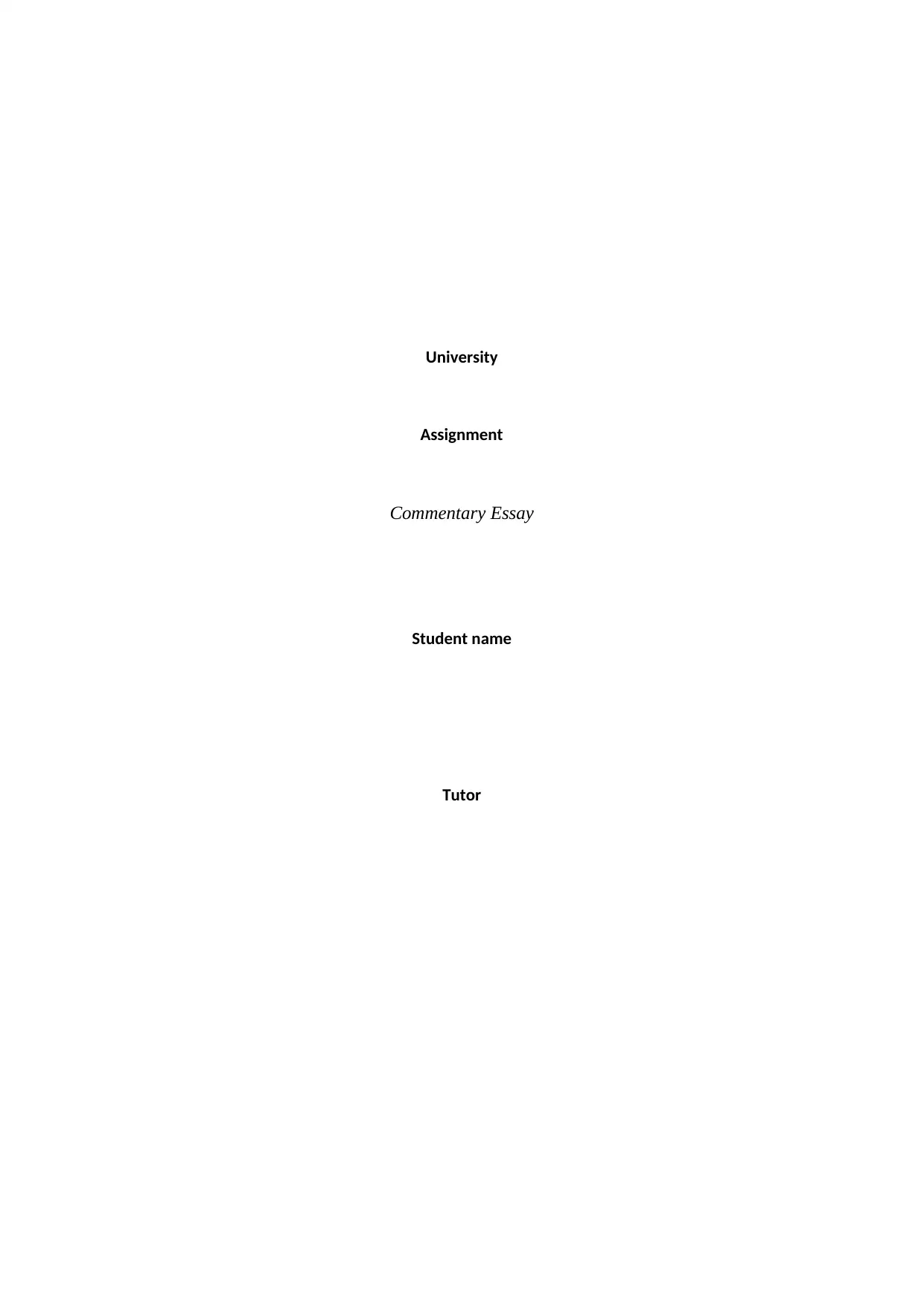
University
Assignment
Commentary Essay
Student name
Tutor
Assignment
Commentary Essay
Student name
Tutor
Paraphrase This Document
Need a fresh take? Get an instant paraphrase of this document with our AI Paraphraser
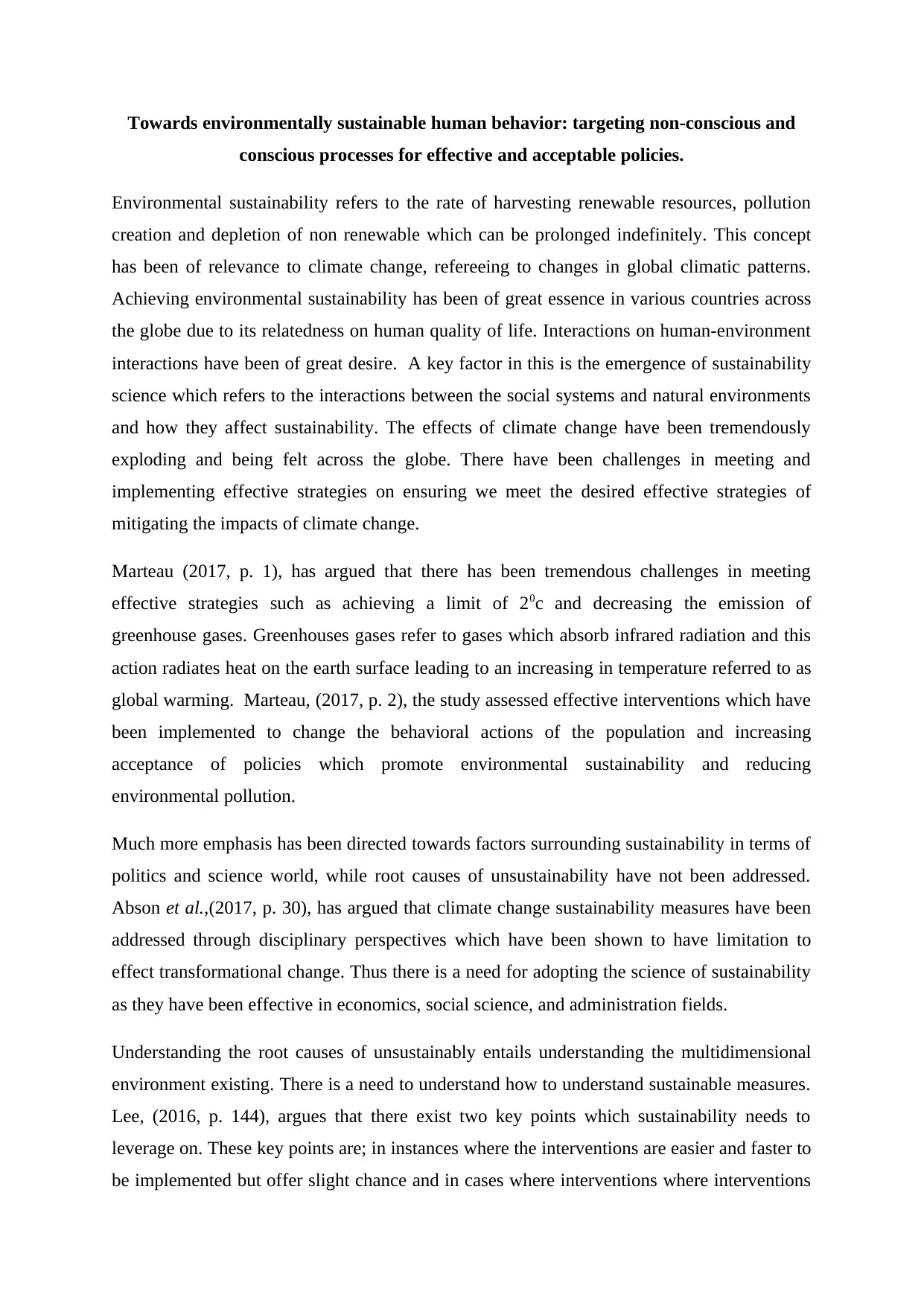
Towards environmentally sustainable human behavior: targeting non-conscious and
conscious processes for effective and acceptable policies.
Environmental sustainability refers to the rate of harvesting renewable resources, pollution
creation and depletion of non renewable which can be prolonged indefinitely. This concept
has been of relevance to climate change, refereeing to changes in global climatic patterns.
Achieving environmental sustainability has been of great essence in various countries across
the globe due to its relatedness on human quality of life. Interactions on human-environment
interactions have been of great desire. A key factor in this is the emergence of sustainability
science which refers to the interactions between the social systems and natural environments
and how they affect sustainability. The effects of climate change have been tremendously
exploding and being felt across the globe. There have been challenges in meeting and
implementing effective strategies on ensuring we meet the desired effective strategies of
mitigating the impacts of climate change.
Marteau (2017, p. 1), has argued that there has been tremendous challenges in meeting
effective strategies such as achieving a limit of 20c and decreasing the emission of
greenhouse gases. Greenhouses gases refer to gases which absorb infrared radiation and this
action radiates heat on the earth surface leading to an increasing in temperature referred to as
global warming. Marteau, (2017, p. 2), the study assessed effective interventions which have
been implemented to change the behavioral actions of the population and increasing
acceptance of policies which promote environmental sustainability and reducing
environmental pollution.
Much more emphasis has been directed towards factors surrounding sustainability in terms of
politics and science world, while root causes of unsustainability have not been addressed.
Abson et al.,(2017, p. 30), has argued that climate change sustainability measures have been
addressed through disciplinary perspectives which have been shown to have limitation to
effect transformational change. Thus there is a need for adopting the science of sustainability
as they have been effective in economics, social science, and administration fields.
Understanding the root causes of unsustainably entails understanding the multidimensional
environment existing. There is a need to understand how to understand sustainable measures.
Lee, (2016, p. 144), argues that there exist two key points which sustainability needs to
leverage on. These key points are; in instances where the interventions are easier and faster to
be implemented but offer slight chance and in cases where interventions where interventions
conscious processes for effective and acceptable policies.
Environmental sustainability refers to the rate of harvesting renewable resources, pollution
creation and depletion of non renewable which can be prolonged indefinitely. This concept
has been of relevance to climate change, refereeing to changes in global climatic patterns.
Achieving environmental sustainability has been of great essence in various countries across
the globe due to its relatedness on human quality of life. Interactions on human-environment
interactions have been of great desire. A key factor in this is the emergence of sustainability
science which refers to the interactions between the social systems and natural environments
and how they affect sustainability. The effects of climate change have been tremendously
exploding and being felt across the globe. There have been challenges in meeting and
implementing effective strategies on ensuring we meet the desired effective strategies of
mitigating the impacts of climate change.
Marteau (2017, p. 1), has argued that there has been tremendous challenges in meeting
effective strategies such as achieving a limit of 20c and decreasing the emission of
greenhouse gases. Greenhouses gases refer to gases which absorb infrared radiation and this
action radiates heat on the earth surface leading to an increasing in temperature referred to as
global warming. Marteau, (2017, p. 2), the study assessed effective interventions which have
been implemented to change the behavioral actions of the population and increasing
acceptance of policies which promote environmental sustainability and reducing
environmental pollution.
Much more emphasis has been directed towards factors surrounding sustainability in terms of
politics and science world, while root causes of unsustainability have not been addressed.
Abson et al.,(2017, p. 30), has argued that climate change sustainability measures have been
addressed through disciplinary perspectives which have been shown to have limitation to
effect transformational change. Thus there is a need for adopting the science of sustainability
as they have been effective in economics, social science, and administration fields.
Understanding the root causes of unsustainably entails understanding the multidimensional
environment existing. There is a need to understand how to understand sustainable measures.
Lee, (2016, p. 144), argues that there exist two key points which sustainability needs to
leverage on. These key points are; in instances where the interventions are easier and faster to
be implemented but offer slight chance and in cases where interventions where interventions
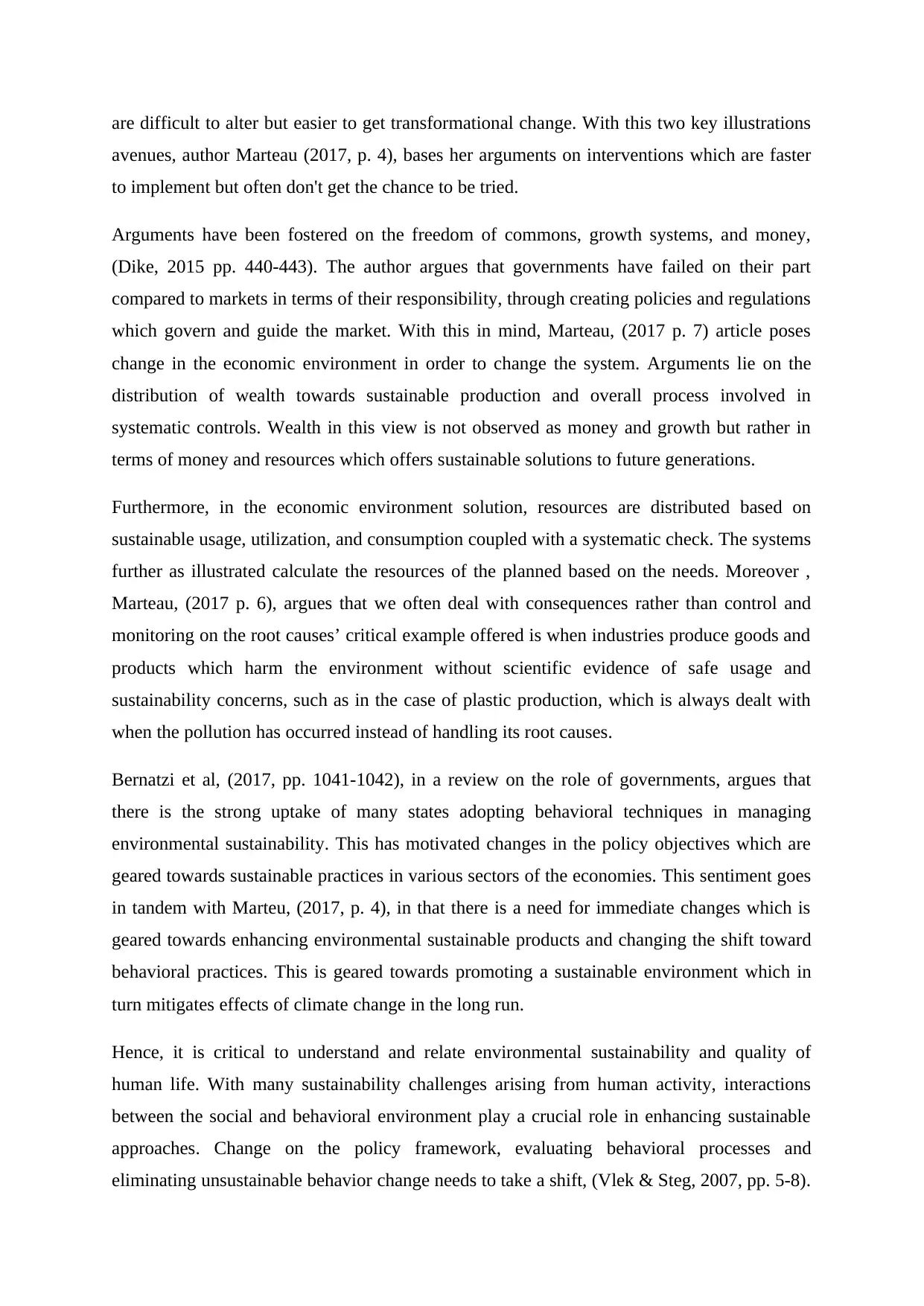
are difficult to alter but easier to get transformational change. With this two key illustrations
avenues, author Marteau (2017, p. 4), bases her arguments on interventions which are faster
to implement but often don't get the chance to be tried.
Arguments have been fostered on the freedom of commons, growth systems, and money,
(Dike, 2015 pp. 440-443). The author argues that governments have failed on their part
compared to markets in terms of their responsibility, through creating policies and regulations
which govern and guide the market. With this in mind, Marteau, (2017 p. 7) article poses
change in the economic environment in order to change the system. Arguments lie on the
distribution of wealth towards sustainable production and overall process involved in
systematic controls. Wealth in this view is not observed as money and growth but rather in
terms of money and resources which offers sustainable solutions to future generations.
Furthermore, in the economic environment solution, resources are distributed based on
sustainable usage, utilization, and consumption coupled with a systematic check. The systems
further as illustrated calculate the resources of the planned based on the needs. Moreover ,
Marteau, (2017 p. 6), argues that we often deal with consequences rather than control and
monitoring on the root causes’ critical example offered is when industries produce goods and
products which harm the environment without scientific evidence of safe usage and
sustainability concerns, such as in the case of plastic production, which is always dealt with
when the pollution has occurred instead of handling its root causes.
Bernatzi et al, (2017, pp. 1041-1042), in a review on the role of governments, argues that
there is the strong uptake of many states adopting behavioral techniques in managing
environmental sustainability. This has motivated changes in the policy objectives which are
geared towards sustainable practices in various sectors of the economies. This sentiment goes
in tandem with Marteu, (2017, p. 4), in that there is a need for immediate changes which is
geared towards enhancing environmental sustainable products and changing the shift toward
behavioral practices. This is geared towards promoting a sustainable environment which in
turn mitigates effects of climate change in the long run.
Hence, it is critical to understand and relate environmental sustainability and quality of
human life. With many sustainability challenges arising from human activity, interactions
between the social and behavioral environment play a crucial role in enhancing sustainable
approaches. Change on the policy framework, evaluating behavioral processes and
eliminating unsustainable behavior change needs to take a shift, (Vlek & Steg, 2007, pp. 5-8).
avenues, author Marteau (2017, p. 4), bases her arguments on interventions which are faster
to implement but often don't get the chance to be tried.
Arguments have been fostered on the freedom of commons, growth systems, and money,
(Dike, 2015 pp. 440-443). The author argues that governments have failed on their part
compared to markets in terms of their responsibility, through creating policies and regulations
which govern and guide the market. With this in mind, Marteau, (2017 p. 7) article poses
change in the economic environment in order to change the system. Arguments lie on the
distribution of wealth towards sustainable production and overall process involved in
systematic controls. Wealth in this view is not observed as money and growth but rather in
terms of money and resources which offers sustainable solutions to future generations.
Furthermore, in the economic environment solution, resources are distributed based on
sustainable usage, utilization, and consumption coupled with a systematic check. The systems
further as illustrated calculate the resources of the planned based on the needs. Moreover ,
Marteau, (2017 p. 6), argues that we often deal with consequences rather than control and
monitoring on the root causes’ critical example offered is when industries produce goods and
products which harm the environment without scientific evidence of safe usage and
sustainability concerns, such as in the case of plastic production, which is always dealt with
when the pollution has occurred instead of handling its root causes.
Bernatzi et al, (2017, pp. 1041-1042), in a review on the role of governments, argues that
there is the strong uptake of many states adopting behavioral techniques in managing
environmental sustainability. This has motivated changes in the policy objectives which are
geared towards sustainable practices in various sectors of the economies. This sentiment goes
in tandem with Marteu, (2017, p. 4), in that there is a need for immediate changes which is
geared towards enhancing environmental sustainable products and changing the shift toward
behavioral practices. This is geared towards promoting a sustainable environment which in
turn mitigates effects of climate change in the long run.
Hence, it is critical to understand and relate environmental sustainability and quality of
human life. With many sustainability challenges arising from human activity, interactions
between the social and behavioral environment play a crucial role in enhancing sustainable
approaches. Change on the policy framework, evaluating behavioral processes and
eliminating unsustainable behavior change needs to take a shift, (Vlek & Steg, 2007, pp. 5-8).
⊘ This is a preview!⊘
Do you want full access?
Subscribe today to unlock all pages.

Trusted by 1+ million students worldwide
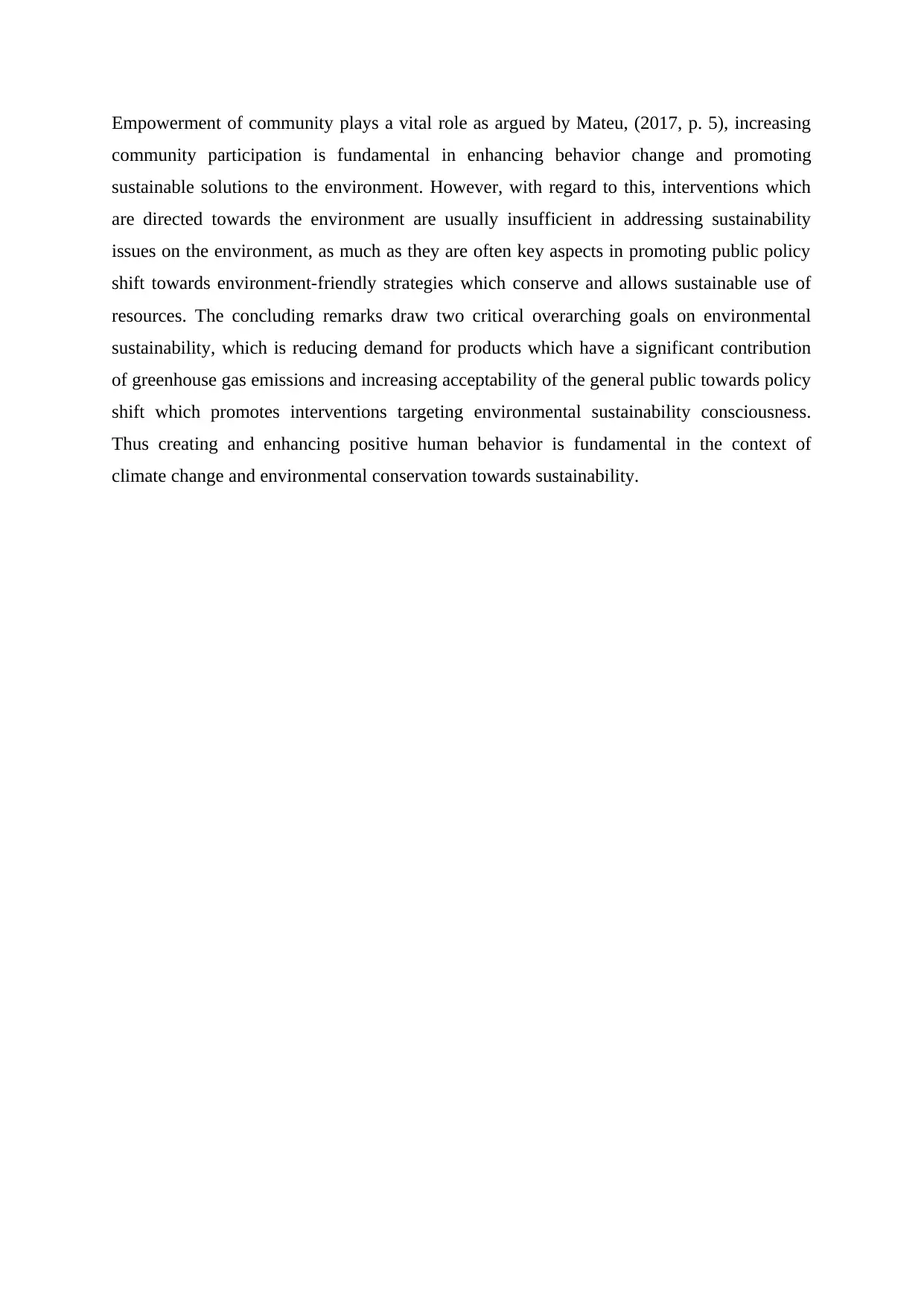
Empowerment of community plays a vital role as argued by Mateu, (2017, p. 5), increasing
community participation is fundamental in enhancing behavior change and promoting
sustainable solutions to the environment. However, with regard to this, interventions which
are directed towards the environment are usually insufficient in addressing sustainability
issues on the environment, as much as they are often key aspects in promoting public policy
shift towards environment-friendly strategies which conserve and allows sustainable use of
resources. The concluding remarks draw two critical overarching goals on environmental
sustainability, which is reducing demand for products which have a significant contribution
of greenhouse gas emissions and increasing acceptability of the general public towards policy
shift which promotes interventions targeting environmental sustainability consciousness.
Thus creating and enhancing positive human behavior is fundamental in the context of
climate change and environmental conservation towards sustainability.
community participation is fundamental in enhancing behavior change and promoting
sustainable solutions to the environment. However, with regard to this, interventions which
are directed towards the environment are usually insufficient in addressing sustainability
issues on the environment, as much as they are often key aspects in promoting public policy
shift towards environment-friendly strategies which conserve and allows sustainable use of
resources. The concluding remarks draw two critical overarching goals on environmental
sustainability, which is reducing demand for products which have a significant contribution
of greenhouse gas emissions and increasing acceptability of the general public towards policy
shift which promotes interventions targeting environmental sustainability consciousness.
Thus creating and enhancing positive human behavior is fundamental in the context of
climate change and environmental conservation towards sustainability.
Paraphrase This Document
Need a fresh take? Get an instant paraphrase of this document with our AI Paraphraser
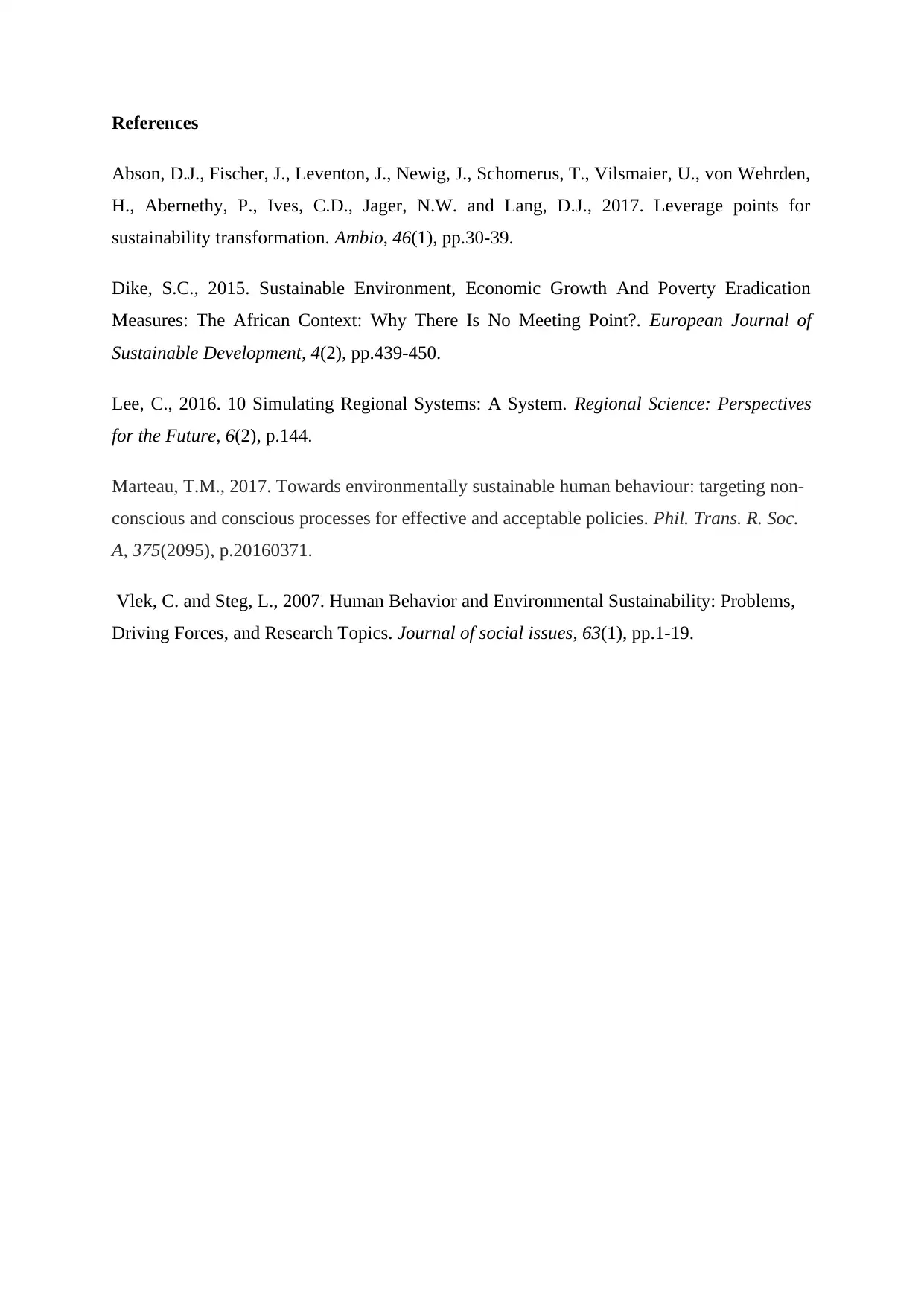
References
Abson, D.J., Fischer, J., Leventon, J., Newig, J., Schomerus, T., Vilsmaier, U., von Wehrden,
H., Abernethy, P., Ives, C.D., Jager, N.W. and Lang, D.J., 2017. Leverage points for
sustainability transformation. Ambio, 46(1), pp.30-39.
Dike, S.C., 2015. Sustainable Environment, Economic Growth And Poverty Eradication
Measures: The African Context: Why There Is No Meeting Point?. European Journal of
Sustainable Development, 4(2), pp.439-450.
Lee, C., 2016. 10 Simulating Regional Systems: A System. Regional Science: Perspectives
for the Future, 6(2), p.144.
Marteau, T.M., 2017. Towards environmentally sustainable human behaviour: targeting non-
conscious and conscious processes for effective and acceptable policies. Phil. Trans. R. Soc.
A, 375(2095), p.20160371.
Vlek, C. and Steg, L., 2007. Human Behavior and Environmental Sustainability: Problems,
Driving Forces, and Research Topics. Journal of social issues, 63(1), pp.1-19.
Abson, D.J., Fischer, J., Leventon, J., Newig, J., Schomerus, T., Vilsmaier, U., von Wehrden,
H., Abernethy, P., Ives, C.D., Jager, N.W. and Lang, D.J., 2017. Leverage points for
sustainability transformation. Ambio, 46(1), pp.30-39.
Dike, S.C., 2015. Sustainable Environment, Economic Growth And Poverty Eradication
Measures: The African Context: Why There Is No Meeting Point?. European Journal of
Sustainable Development, 4(2), pp.439-450.
Lee, C., 2016. 10 Simulating Regional Systems: A System. Regional Science: Perspectives
for the Future, 6(2), p.144.
Marteau, T.M., 2017. Towards environmentally sustainable human behaviour: targeting non-
conscious and conscious processes for effective and acceptable policies. Phil. Trans. R. Soc.
A, 375(2095), p.20160371.
Vlek, C. and Steg, L., 2007. Human Behavior and Environmental Sustainability: Problems,
Driving Forces, and Research Topics. Journal of social issues, 63(1), pp.1-19.
1 out of 5
Related Documents
Your All-in-One AI-Powered Toolkit for Academic Success.
+13062052269
info@desklib.com
Available 24*7 on WhatsApp / Email
![[object Object]](/_next/static/media/star-bottom.7253800d.svg)
Unlock your academic potential
Copyright © 2020–2026 A2Z Services. All Rights Reserved. Developed and managed by ZUCOL.





